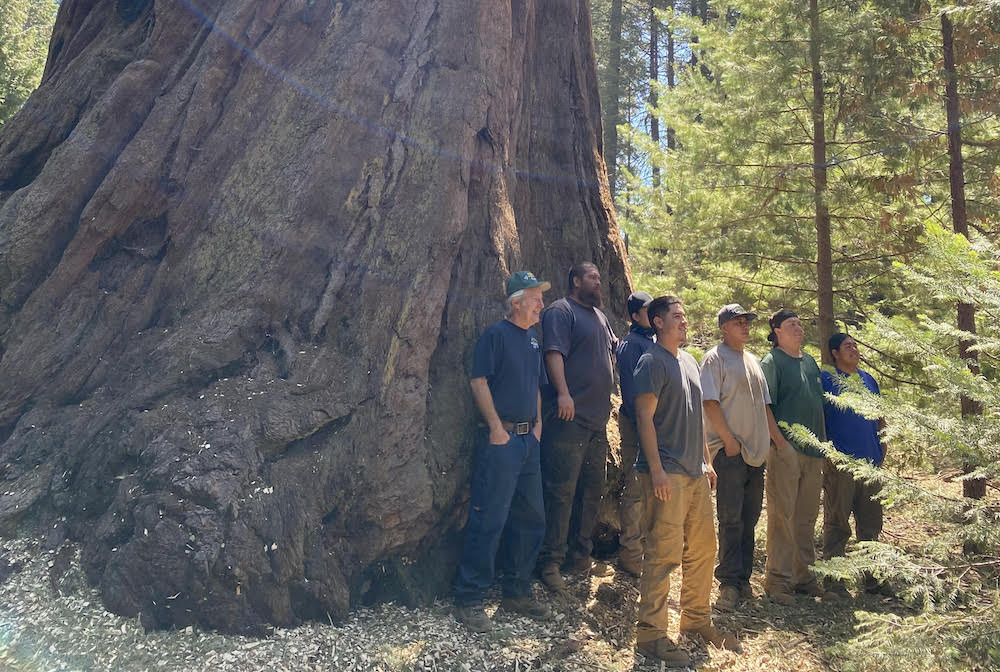
- Details
- By Cody Desautel, Intertribal Timber Council
- Opinion | Op-Ed
OPINION. Older forests on federal lands are being lost to increasingly devastating wildfires, insects, and disease. In June, the U.S. Forest Service published a draft environmental impact statement for the conservation of “old-growth” forests nationwide. A final impact statement and decision are expected in early December.
While the Forest Service’s draft statement on old-growth conservation has opened the door for public comment, there are significant concerns that the proposed amendments could restrict effective forest stewardship. As tribes, we bring deep connections to the land and centuries of knowledge that are vital to sustaining these irreplaceable ecosystems. As president of the Intertribal Timber Council (ITC), I advocate for the integration of Indigenous forest management practices into national policies, especially in managing old-growth forests.
One of our main concerns at the ITC is the potential for overly restrictive regulations on old-growth forest management. While it is critical to conserve these forests, the Forest Service’s plan to prioritize certain areas for future old-growth could limit the flexibility needed for active forest management. My fear is that these designations may hinder essential interventions, like thinning or prescribed burns, that are necessary to reduce the risk of catastrophic wildfires and promote forest health.
Old-growth forests are not static; they have evolved with dynamic natural processes such as fire, which tribes have historically managed through cultural burning. For centuries, these traditional practices maintained ecological balance, promoting forest resilience. Unfortunately, modern fire suppression policies, combined with the exclusion of Indigenous knowledge, have disrupted these cycles, leaving forests vulnerable to wildfires, insect infestations, and disease. The rigid protection of old-growth areas, without accounting for the natural disturbances that have shaped them, could exacerbate these threats.
At the ITC, we advocate for a proactive and adaptive approach to forest management—one that draws from Indigenous ecological knowledge and allows for diverse management activities. This could include thinning, prescribed burns, and selective logging—practices that not only reduce fire risks but also promote the long-term sustainability of forests. The best way to ensure the health of old-growth forests is to return them to their historic fire regimes and densities, allowing them to regenerate naturally, rather than engineering artificial management frameworks.
Another critical issue is the potential overemphasis on old-growth conservation at the expense of other forest types. While old-growth forests are essential, the Forest Service’s approach risks diverting attention and resources away from younger forests, which are equally vulnerable to wildfire, pests, and disease. The ITC believes in a holistic, landscape-scale approach that considers all successional stages of the forest, not just old-growth areas. This balanced strategy would ensure that the entire ecosystem is resilient and adaptable to future climate-driven challenges.
True tribal consultation is not symbolic—it is a government-to-government partnership that recognizes the sovereignty and expertise of Indigenous communities. Our tribal land management programs, grounded in generations of experience, should be considered as co-management models for federal forestlands. Without genuine tribal input, federal policies risk being disconnected from the realities on the ground.
The ITC urges federal agencies to adopt a more flexible, inclusive approach to forest management—one that incorporates Indigenous knowledge, respects tribal sovereignty, and emphasizes proactive stewardship. The future of old-growth forests depends on our ability to move beyond narrow regulatory frameworks and embrace the strengths of tribal forest management. By doing so, we can protect these irreplaceable ecosystems for generations to come in ways that benefit all Americans.
Cody Desautel is president of the Intertribal Timber Council and executive director of the Confederated Tribes of the Colville Reservation in northeastern Washington State. Established in 1976, the Intertribal Timber Council is a nonprofit nation-wide consortium of Indian Tribes, Alaska Native Corporations, and individuals dedicated to improving the management of natural resources of importance to Native American communities.